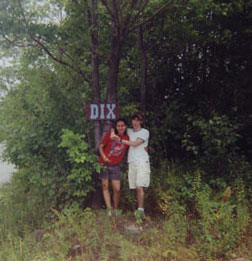When Harry really did stay just friends with Sally
 We’ve said it before, we’ll say it again: straight men and women can be just friends. We know this, because they can even be Just Friends, the boy-girl production company behind this super-enterprise. (And because we are of the camp who liked Scully and Mulder best without the LIKElike.) But perhaps no one has said it so eloquently, or newsworthily, than Juliet Lapidos over at Slate (h/t @DahliaLithwick, @DJDistracted), BFF of Jeff, who believes that today, straight male-female platonicness is at once normal and revolutionary. She writes:
We’ve said it before, we’ll say it again: straight men and women can be just friends. We know this, because they can even be Just Friends, the boy-girl production company behind this super-enterprise. (And because we are of the camp who liked Scully and Mulder best without the LIKElike.) But perhaps no one has said it so eloquently, or newsworthily, than Juliet Lapidos over at Slate (h/t @DahliaLithwick, @DJDistracted), BFF of Jeff, who believes that today, straight male-female platonicness is at once normal and revolutionary. She writes:
We were sure that we would never become romantic partners, that our relationship would always be placidly sexless. This has so far borne out: Excluding the summer when we first met and shared an awkward, pubescent kiss on Independence Day—and another, even more awkward moment on a trampoline shortly thereafter—there’s been no romance. Jeff and I have been friends for more than 14 years, without interruption. In our mid-twenties, we lived together for more than three years, during which period we’d watch movies late into the night and then go our separate ways, much like when we were kids. I find all this, at the personal level, unremarkable and unsurprising; the skepticism of outsiders strikes me as funny and narrow-minded. Yet from a historical perspective, my blasé attitude is all wrong: We are remarkable, in a way, and our relationship is not only surprising but radical.
Yes, radical. Consider the social history here, the dorm-room demographics:
That Jeff and I are friends and nothing more has as much to do with the era in which we live as with our personalities. Summarizing the scholarly consensus, the critic William Deresiewicz has written that “friendship between the sexes appears to have been nonexistent before the 19th century” and did not become a “widely accepted social possibility” until the 20th. Just two generations ago, the institutions that incubate friendship—universities, workplaces, even summer camps (where Jeff and I met)—were still segregated by sex. The college I attended, for example, began admitting women in 1969. And only in the 1970s did employment open up at a rapid clip.  If Jeff and I had been born in, say, 1923 instead of 1983, we might never have had the chance to develop a nonromantic attachment.
There’s evidence that cross-sex friendships, once extremely rare, are increasing along with structural opportunities. In 1981, sociologist Rebecca G. Adams surveyed 70 female senior citizens and found that all but three defined cross-sex friendships as courting relationships. (They were confused by the very concept of a platonic relationship between a man and a woman.) Just over two decades later, in 2002, the magazine American Demographics commissioned a far more sweeping, national survey on friendship and got dramatically different results. It found that more than 1 in 10 adults aged 25 to 34 have a best friend—not just a pal or an acquaintance—of the opposite sex.
My own survey of nearly 600 Slate readers, conducted last winter and spring, also suggests an upward trajectory. I asked respondents to approximate what percentage of their friends had a close but platonic cross-sex relationship. The average for teens was 73 percent; for twentysomethings, 59 percent; for thirtysomethings through fiftysomethings, about half; and for sixtysomethings, 24 percent. The trend could be taken to mean that younger (unmarried, unattached) people are more likely to form cross-sex friendships in any era. But it could also reveal something about the time in which we live: Maybe it’s much easier to make cross-sex friends now than it’s ever been.
Read the rest — and the whole series this week. It’s lovely, and a bit thrilling. Why? Because, for one thing, in straight world (or in any world, really), opposite-sex friendships can help us see the other gender as human, not The Other — not mystery, not adversary. Perhaps even more important, they’re also an end in themselves, opening up the possibility of human connections every which way. Ideally, one day, friends will be just friends, without the wondering, without the insinuating — you know, without the “just.”
What do you think? Share your platonictastic stories here!








